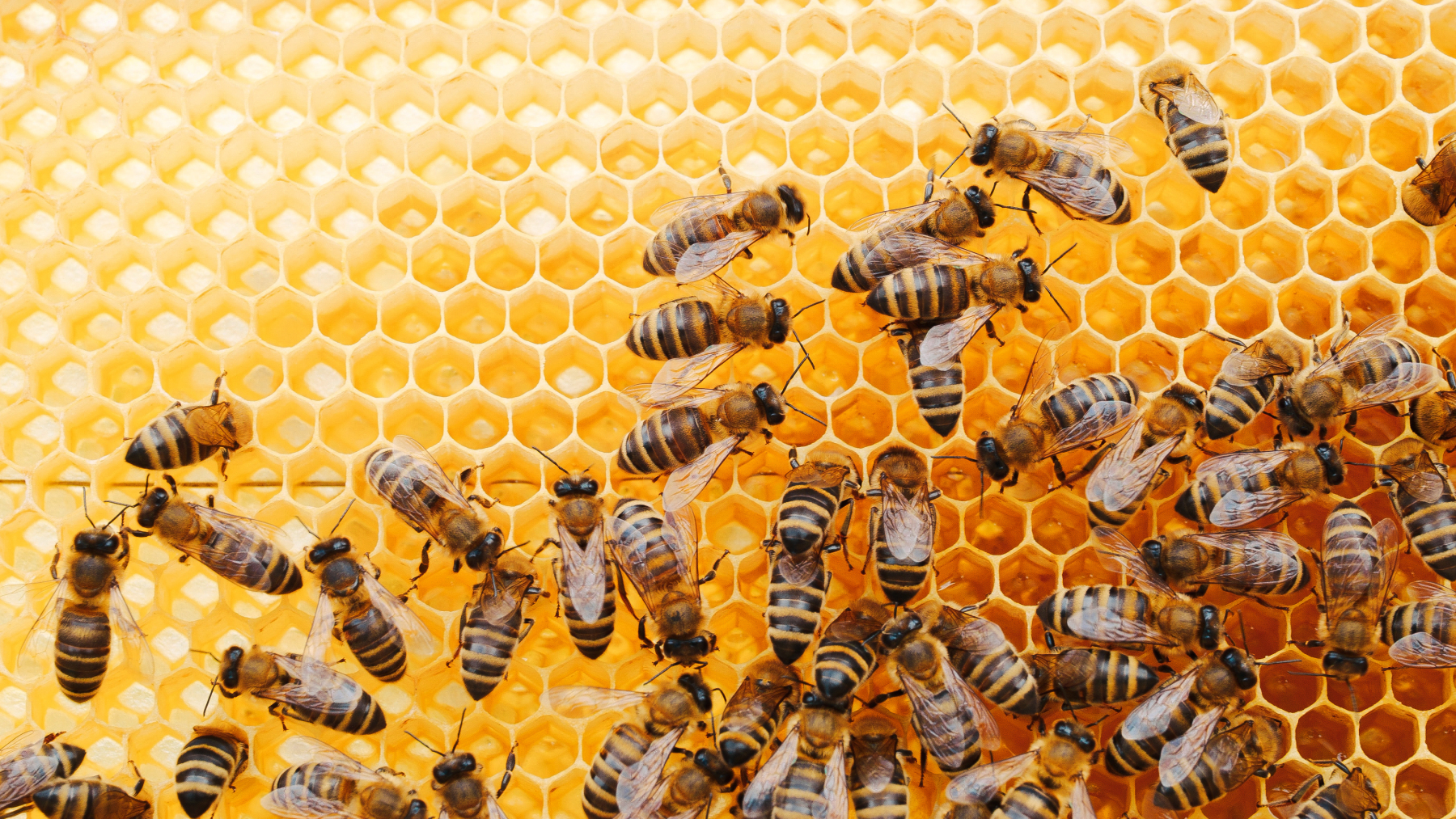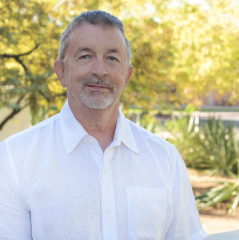
Behavioral neuroscientist examines the intersection between bees and food production
As graduate students, you constantly seek knowledge that can help contribute positively to our society. One of the most important topics we should pay attention to is the role of bees in our ecosystem. Bees have a crucial role in pollination, which helps in producing food for humans and animals alike. This conversation is a two-part interview about bees and their impact on agriculture and food.
To kick off the series, we asked the first interviewee, Jon Harrison, a professor from the School of Life Sciences, about the importance of bees in agriculture. Harrison, an environmental physiologist who studies how insects function, interact with their environment and evolve, stated that bees play a crucial role in pollinating crops. You can read the first part of the series here.
In this second story, we speak to another prolific bee researcher, Brian Smith, an inaugural Trustees of ASU professor and behavioral neuroscientist. In our conversation with Smith, he mirrored Harrison's thoughts on the importance of bees in food production. He emphasized that decreased crop yields would lead to food shortages and price increases. As a researcher focusing on learning and memory systems in insects and mammals, he aims to uncover how a bee's sense of smell relates to behavior encoding in their brains, which influences behavior. He encourages students to stay curious about bee conservation and raise awareness about its importance.
Brian Smith
Inaugural Trustees Professor, ASU
Smith is a behavioral neuroscientist who studies how animals learn about odors in order to predict events such as an encounter with food, a mate or a predator.
Hi Brian, I’m so excited about this conversation! Your research focuses on learning and memory systems in insects and mammals. Can you tell us how you got into this field and where you received your education?
Sure! As you said, I focus on insect and mammal memory systems, but my path took me to many different places. After attending medical school, I received my bachelor's degree from the University of Toronto, then decided it was not what I wanted to do. I left after a semester, and I worked for two years with emotionally disturbed youth. Then, for two years, I installed first-wave solar systems. I had a friend from high school with a master's degree in biology that convinced me I could get a job in biology, which I thought was impossible. So, I got my PhD at the University of Colorado, Boulder. There, I studied both bees and grasshoppers and physiological questions. Then, I went to complete a postdoc at the University of British Columbia, where I studied with an outstanding lab studying the renal system of insects; they were working on locusts. After that, I came to ASU in January 1991 and have been here ever since!
Bee research is a fascinating career path; it’s not something you hear every day. How did you become interested in this field?
Here's a funny story: I wasn't sure what I wanted to do in grad school. I liked ecological questions but had been off for five years “doing weird things" from the standpoint of most of the faculty. I wasn't able to get into the ecological labs I wanted to get into. But there was a new lab with a new faculty member, Todd Gleason, who had the muscle physiology and exercise of lizards. When I first entered the lab, it did not seem interesting. I did not understand why anybody would want to do it. Plus, I had started as a teaching assistant in the animal lab. I had a bad experience with how the animals were handled (the anesthesia was not done correctly). I wanted to do something other than work on the physiology of vertebrates. I signed up for a course in entomology and had the idea of doing the physiology of insects; the person teaching the class was Michael Breed, who worked on bees. So, I became interested in combining my advisor's interest in muscle and exercise physiology and thinking about bees; that was my first project. It was trying to understand how bees fly and whether or not they train the way we train, etc.; I still do things like that all these years later. I was a runner, too. I did a lot of long-term running around Boulder, Colorado, so everything went together. I wanted to figure out how bees can fly so fast. That's what got me into it at first.
What are you researching regarding them currently or in the last couple of years? And then, what types of challenges do you work on regarding bees?
When people talk about bees, they think about honey and honeybees. I've worked on honeybees a lot, which is a major focus. However, it is essential to realize that many species of bees are important in their way. Many native or wild bees are out there. And so we've been studying both honeybees and wild bees for many years. Unfortunately, there's a documented decline in bees worldwide, and we don't understand what's happening with honeybees. They're an agricultural crop that we take care of and grow ourselves. We are seeing increased losses yearly; lately, it's been somewhere in the range of 30%, which is a very high rate compared to historical numbers of colonies dying.
This tells us that even the honeybees are also experiencing environmental stresses. Our research focuses on two significant environmental stresses we want to understand. One is pesticides (in particular, we've been working on fungicides), and the second is elevated temperature. We’re looking at how much climate change is responsible for the decline.
How do bees and beekeeping intersect with food production and the environment?
Insect pollination is responsible for somewhere in the range of 30% of our food. Grains, wheat and things like that don't require insect pollination, but most fruits, vegetables, nuts, coffee, etc. do. It's really about tremendous economic and nutritional importance. We are getting the idea that pollution, in many cases, is limiting the production of our crops. It's a serious problem starting now, so if we can have a continued decline and the bees, it could get very serious.
Food prices will increase a lot, and people won't be able to afford things. We must keep insect pollinators alive and abundant for the long-term sustainability of our human health. As I said, many crops require non-honeybee pollination. So it's not just keeping honey bees around; it's protecting and preserving all bees.
If there was another large drop off of bee populations, how long do you think we'd be able to have some of the food that you mentioned?
It's all a matter of degree. There are desperate measures that could be taken in China; they've been doing hand pollination of crops to try to take care of the lack of insect pollinators. But can you imagine humans trying to transfer pollen onto every flower of an apple tree? It's a really huge job, so it's hard to say. It depends on how bad the drop off was, what sort of amelioration mechanisms would take place; it's hard to predict. There's no doubt we'd rather not have that happen.
Is there anything especially interesting that you learned during your career?
Yes! It's important and underappreciated just how similar insects and humans are; a fruit fly and a human share 70% of their genes, and there's an incredible amount of similarity in how we function. Certainly, there are very important differences, but much less than you'd think from looking at the outside. That has profound implications for so many things that we think about. That is the most important thing I've slowly realized as I've done this work over the last 40 years.
You’ve got a lot going on right now but do you have any long-term goals that you’re excited about?
Yes, I've got a couple of important goals left. I want to make changes in how we regulate our pesticides. A big group of entomologists who work on pollinators put out a paper suggesting how pesticide regulation could change to preserve pollinators. I want to work on that topic to influence the U.S. Environmental Protection Agency.
I'd also like to contribute to figuring out bee decline. We are trying to tease apart the most critical things happening and how we resolve those. I want to build a global consortium with ASU at the Center on Understanding Challenges. It's a human-insect interface. We've worked on locust outbreaks; I'm interested in issues of controlling mosquitoes. I think a lot could be done to pull together the expertise around the world we can bring together with the sustainability science viewpoint of ASU to make some long-term headway on these problems.
I'm interested in writing a couple of books as well. I wrote a book on environmental insect physiology, so I'd like to do another edition. I'd also like to write a more public-facing book to get people to think about insects' importance, value and vulnerability.
So do you have any advice for students who are interested in your field or if not your field, just higher education in general?
Just get involved and find the role that fits you. Some people have talents in different areas. Mine were in experimental science, so getting mentored in a lab where I was taught about methods and theories of solving problems experimentally in science was incredibly valuable. I encourage ASU undergrads to get involved in labs to research if they can. That's the best way to understand research and find out if it's something you're interested in doing.
How have you interacted with the Graduate College?
I have been involved in choosing the Outstanding Graduate Mentors; I’ve been on the committee for many years. Generally, I am passionate about graduate education and undergraduate research involvement.
Read part two of the interview series with Jon Harrison
More stories from the Graduate Insider

Inside Graduate College’s Three Minute Thesis competition
When Aliyah Egan stepped onto the stage as a master’s student in last year’s Graduate College Three Minute Thesis (3MT) competition, she faced a challenge familiar to many researchers: explaining complex, specialized work to an audience with little or no background in her field.

Mentoring with intention: Strengthening graduate support at ASU
January is National Mentoring Month, a time to celebrate the impact mentoring can have and to reflect honestly on where gaps remain. At Arizona State University, mentoring is recognized as a critical component of graduate student success.

Graduate education is an adventure
About eighteen months ago, I set out on a journey walking the islands of the Dodecanese during a sailing trip in Türkiye and Greece with several friends. Along the way, I found winding paths, timeless villages and breathtaking views of sea and sky. That experience got me thinking about how adventure shows up in other parts of life, especially in learning.
